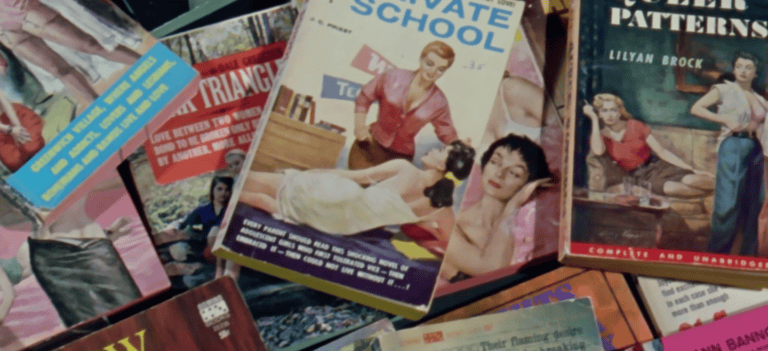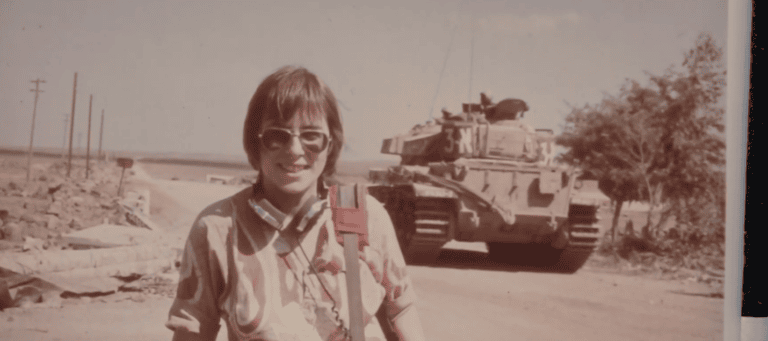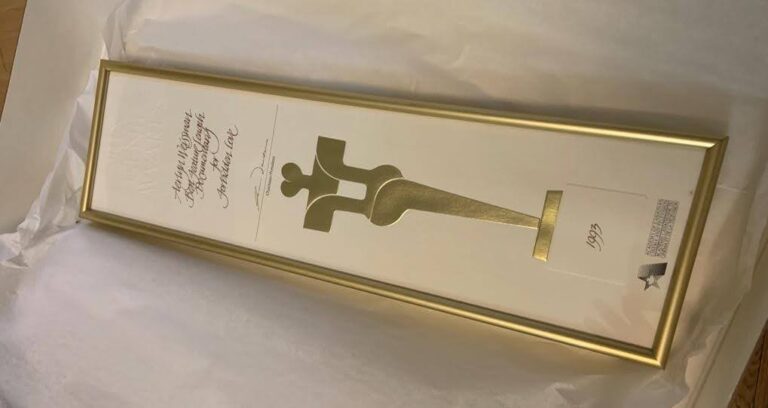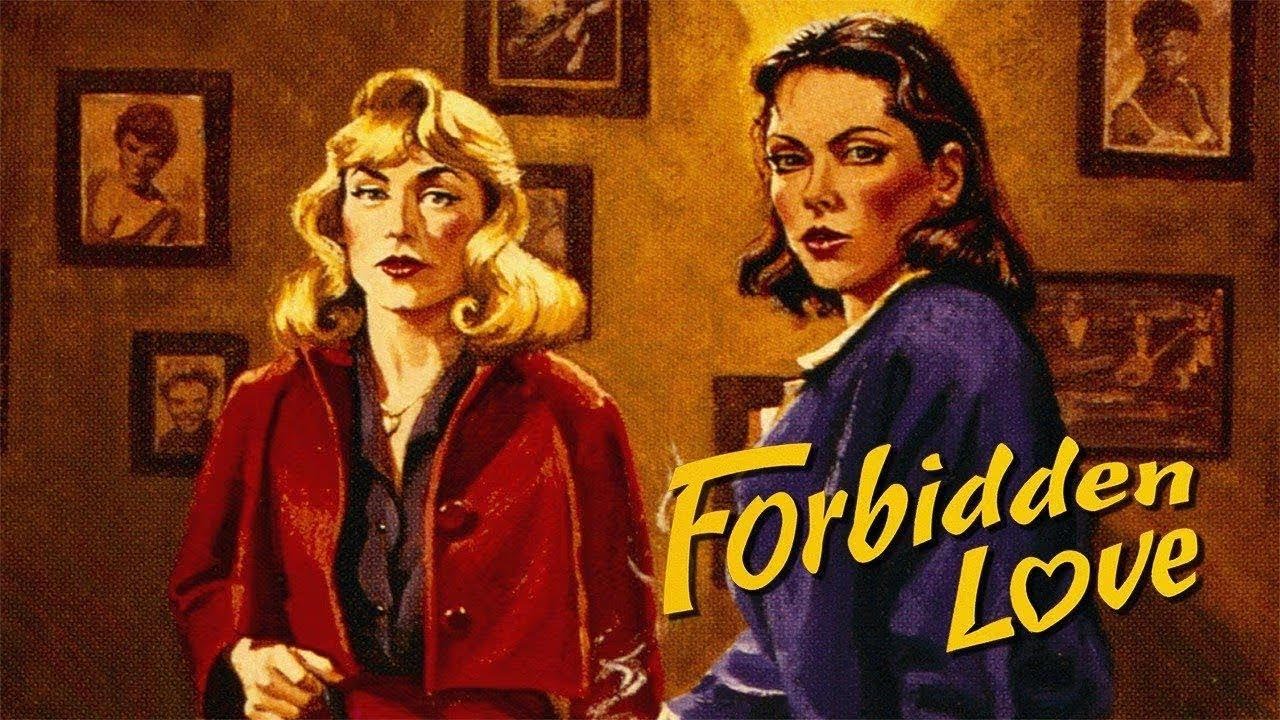Communications volunteer Ester Bovard takes a closer look at a generous recent donation from award-winning filmmaker and activist Aerlyn Weissman, and what it means for lesbian history.
The stories we tell matter. They affirm our existence and shape our identities not only as individuals but as communities, creating space to imagine greater possibilities for the future. From our current vantage, gazing across a sea of seemingly infinite streaming video, it can be challenging to remember how invisible the stories of lesbian lives once were. For a long time, representations of lesbians in popular culture were few and far between, and the ones that did exist – such as the pulp novels of the fifties and sixties – tended to position them as tragic figures destined to live out their years pining away in solitude … or worse.

A selection of lesbian pulp novels. Source: Screenshot from Forbidden Love: The Unashamed Stories of Lesbian Lives
Happily, the early nineties ushered in an exciting new era for lesbian visibility, with a proliferation of films like The Watermelon Woman (Cheryl Dunye), Go Fish (Rose Troche), and Better Than Chocolate (Anne Wheeler) allowing queer women to see themselves represented in a way they never had before. Building on the earlier work of filmmakers like Donna Deitch (Desert Hearts) and Patricia Rozema (I’ve Heard the Mermaids Singing), these films dared to represent lesbian lives and characters with unprecedented depth, complexity, and humour. At the forefront of this cinematic movement was filmmaker Aerlyn Weissman, whose landmark documentary Forbidden Love: The Unashamed Stories of Lesbian Lives (co-directed with Lynne Fernie) was instrumental in increasing the visibility of lesbians in the cultural landscape, and remains one of the most significant documents of lesbian history in Canada to this day.

Aerlyn Weissman working on location as a sound recordist. Source: Screenshot from Aerlyn Weissman
Getting her start as a sound recordist and designer in the seventies and eighties, Weissman contributed to a wide array of projects, including the groundbreaking films P4W and Hookers on Davie by fellow queer filmmakers Holly Dale and Janis Cole. Inspired by the many stories she heard over the years, Weissman eventually sought to find her voice as a filmmaker, and through a chance meeting with Lynne Fernie, the idea for Forbidden Love was born. Sharing a common interest in lesbian culture and acutely aware of how little information was available about the history of lesbians in Canada, they gamely set out to rectify the situation.
Securing funding from the NFB’s storied Studio D – the world’s first publicly funded feminist filmmaking studio – the pair threw themselves into the mammoth task of combing through thousands of archival records to unearth any bits of lesbian history they could find. Shockingly, the stock footage library at the NFB lacked categories for “lesbian,” “gay,” or “homosexual,” reflecting the problematic reality of queer invisibility at even the archival level. Determined to subvert the biases of an archive that categorized homosexuality solely as criminal or deviant, the filmmakers spent weeks poring over every piece of footage categorized under “crime” or “police” to unearth the histories hidden in plain sight. Unabashedly vocal about their efforts, Weissman and Fernie’s work was instrumental in challenging prevailing institutional attitudes towards gay and lesbian visibility in the archive.
Mixing revealing interviews and archival footage with a series of dramatized vignettes reimagining a traditional lesbian pulp fiction story, Forbidden Love stands apart from the more conventional structure of previous Studio D documentaries in both subject matter and aesthetic. Subverting the tragic ending trope of those early pulp novels, it firmly positions itself within the tradition of nineties-era lesbian films that dared to dump the tragedy and end happily without sacrificing the nuanced reality of its subjects’ lives. Despite calls from Studio D to sanitize their histories of potentially negative elements, Weissman and Fernie provided their subjects with an open platform to tell their stories precisely as they wished. Pulling back the curtain on the reality of early lesbian lives across the country, Forbidden Love made an enormous contribution to queer history in Canada, and serves as a remarkable archival document in and of itself.
While Forbidden Love is certainly Weissman’s best-known work, she has consistently championed gay and lesbian voices throughout her career. Following their early success, Weissman and Fernie produced the short documentary Fiction and Other Truths: A Film About Jane Rule. A portrait of lesbian author Jane Rule – whose novel Desert of the Heart famously inspired the cult-classic film Desert Hearts – the film honours both her literary achievements and her lifelong work as an anti-censorship activist. Fittingly, Weissman later spent years chronicling the battle of independent gay and lesbian bookstore Little Sister’s against Canada’s powerful border services agency. Featuring an impressive slate of writers and activists, Little Sister’s vs. Big Brother follows their fight against censorship and cultural erasure all the way to the Supreme Court.

Aerlyn Weissman’s Genie Award for Forbidden Love: The Unashamed Stories of Lesbian Lives. Source: The ArQuives Collection
Few filmmakers have demonstrated a deeper commitment to increasing the visibility of lesbian lives in this country than Weissman has throughout her career. Despite her relatively brief filmography, her work has had a remarkable effect on the cinematic landscape, expanding the boundaries of the Canadian lesbian imaginary and paving the way for future generations. Building on this already considerable legacy, Weissman has recently chosen to make a significant personal donation to The ArQuives, fittingly adding the story of her own life to the lesbian archival canon that she spent decades expanding. In archive-speak, Weissman’s donation is what we call a fonds: a collection of records and items accumulated organically by a group or individual in the natural course of their work or lives. Collections like these, which tend to include a combination of personal and professional items, are fascinating for their ability to paint the broad scope of a person’s life and, in the case of artists and creators such as Weissman, provide valuable context for the works they produce. With the potential to contain anything from quilts to mugs to family photographs and personal correspondence, their totality presents a unique opportunity to understand the broader context of an individual’s life and work in unexpected ways. Given the wide-ranging nature of such donations, evaluating and preparing each item in Weissman’s collection may take months or even years, but it will no doubt be more than worth the wait.
Citations:
“Aerlyn Weissman.” Wikipedia, https://en.wikipedia.org/wiki/Aerlyn_Weissman.
Bruce, Jean, and Gerda Cammaer. “Queer Visibility and the Archive.” Forbidden Love: A Queer Film Classic. Arsenal Pulp Press, 2015.
Costa, Daniela. “The History of ‘Forbidden Love,’ the World’s Best Documentary About Early Lesbian
Lives.” After Ellen, December 4, 2015. https://afterellen.com/history-forbidden-love-worlds-best-documentary-early-lesbian-lives/.
“Forbidden Love: The Unashamed Stories of Lesbian Lives.” Wikipedia,
https://en.wikipedia.org/wiki/Forbidden_Love:_The_Unashamed_Stories_of_Lesbian_Lives.
Hays, Matthew. “Lynne Fernie and Aerlyn Weissman: Out of the Shadows.” The View from Here:
Conversations with Gay and Lesbian Filmmakers. Arsenal Pulp Press, 2007.
Russell, Erin. Aerlyn Weissman. Reel Youth, 2018. https://www.reelyouth.ca/troublemakers-2018.html.
“Studio D: The Women’s Film Studio.” NFB, https://www.nfb.ca/channels/studio-d-films-women-
women/.
Watch List:
Desert Hearts (Donna Deitch, 1985)
I’ve Heard the Mermaids Singing (Patricia Rozema, 1987)
Forbidden Love: The Unashamed Stories of Lesbian Lives (Aerlyn Weissman and Lynne Fernie, 1992)
Last Call at Maud’s (Paris Poirier, 1993)
Go Fish (Rose Troche, 1994)
Fiction and Other Truths: A Film About Jane Rule (Aerlyn Weissman and Lynne Fernie, 1995)
The Watermelon Woman (Cheryl Dunye, 1996)
Stolen Moments (Margaret Westcott, 1997)
Better Than Chocolate (Anne Wheeler, 1999)
Little Sister’s vs. Big Brother (Aerlyn Weissman, 2002)
Author Bio: Ester Bovard is an archival film scholar and writer based in Toronto. A graduate of the MA programme in Preservation & Presentation of the Moving Image at the University of Amsterdam, she has collaborated on projects with Arsenal Institute for Film and Video Art, UMAM Documentation & Research, and the Netherlands Institute for Sound & Vision.

